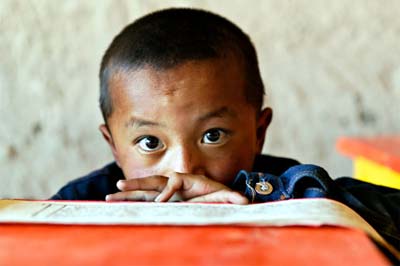Dec 16, 2025
Dec 16, 2025
China celebrated the 69th anniversary of Communist rule with a massive display of its military power both conventional military power and its strategic assets in terms of ICBMs. The world was not enthused or excited by what the ruling Chinese Communist regime intended to herald its arrival as a major global military power in a sensational manner. The international community had prepared itself to the reality of emergence of China’s military power and that emergent Chinese military power would not be benign in terms of contributing to global stability. In fact the strategic reality was just the reverse.
 Nowhere is the perversity of China’s emergent military power more manifested than in the Chinese military occupation of Tibet, the Chinese militarization of the Greater Tibet Region, and the ethnic and cultural genocide that China has inflicted on the peaceful and spiritual people of Tibet.
Nowhere is the perversity of China’s emergent military power more manifested than in the Chinese military occupation of Tibet, the Chinese militarization of the Greater Tibet Region, and the ethnic and cultural genocide that China has inflicted on the peaceful and spiritual people of Tibet.
The international community should not be an idle bystander to the Chinese concerted effort to force the Tibetan nation into permanent extinction. If the United States could be moved to military interventions in Bosnia and Kosovo on humanitarian grounds then Tibet is an outstandingly more fit case for global humanitarian intervention.
His Holiness The Dalai Lama who is the living symbol of the Tibetan nation and was forced to flee Tibet by Chinese military brutalities to India in exile has patiently striven for the last fifty years to seek a peaceful political solution of Tibet’s independence. Endless rounds of negotiations with the Chinese Government have not yielded any positive results. China continues to revile the spiritual personality of The Dalai Lama in debased terms bankrupt as the Chinese regime is in terms of moral propriety and norms of decency
China does so because with all the military power at its command it is rendered impotent by the divine force and strength of the moral authority of His Holiness The Dalai Lama and the cause which he represents.
It is high time for the international community to recognize that if it does not stop China in its tracks forthwith in the brutal suppression of Tibet it would be forced with greater military challenges and aggression by China. To say that the international community is short of options to bring China to back-off from Tibet would be a travesty of both truth and reality.
China’s brutal suppression of the Xingjian unrest by the Uighur Moslem population brought forth sharp ripostes from the Organization of Islamic Countries and also from Turkey as the most powerful Turkic speaking nation.
Regrettably, no Buddhist nation has to my knowledge spoken out in favor of Tibet and the cause of the Tibetan independence. From Japan and South Korea to virtually the whole of South East Asia and Sri Lanka lie predominantly Buddhist countries who also revere The Dali Lama as a Buddhist spiritual leader. Then why do the leaders of these Buddhist nations become tongue-tied when it comes supporting Tibet’s independence? Why do these Buddhist nations do not criticize China for the brutal sufferings that China inflicts on the hapless people of Tibet?
In the United States and other Western countries there are hundreds and thousands of ordinary people who support the cause of Tibet’s independence and speak out against the ethnic and cultural genocide that China continues to inflict in Tibet on the strength of its unrestrained military power. Why do the heads of state shy away from meeting The Dalai Lama when he visits these countries on invitations from civic organizations?
Globally, heads of powerful countries become timid when it comes to China and supporting Tibetan independence because they forsake moral principles in favor of strategic and political expediency to protect their business interests with China.
Therefore when it comes to the question of promoting the cause of Tibetan independence and liberating it from the Chinese yoke one cannot expect that the leaders of major Western Powers and those of Buddhist nations to stand up and be counted by speaking out against China. It stands left now to civil society organizations advocating democracy and freedom from suppression to unite the world over in a concerted manner to fight for Tibet’s independence more vociferously.
The silent majority the world over should now unite the world over to speak out for Tibetan independence and force their political leaders to become more vocal on the issue of Tibet’s independence.
05-Oct-2009
More by : Dr. Subhash Kapila